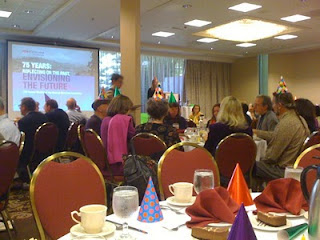Thoughts from a Conference-Goer . . .
The Western Museums Association put on a GREAT conference! I just spent a few days in Portland, reacquainting myself with some long-lost pals, making new connections, doing some professional development and basically spending my time really really well. I feel so fortunate to be working in the same profession as these amazing people!
None other than author and museum-thinker John Falk was the keynote speaker on the first day. He spoke about WHO and WHY people come to museums. He says it is often their 'little i' identity that brings them in the door, often as one (or a combo) of one of the five:
1. explorer - they are interested and want to know more
2. facilitator - they go for someone else, as a support
3. experience seeker - they want to go visit, and say they have been (ie Louvre in Paris)
4. professional or hobbyist - they go because it relates to work, and/or have a solid love of the topic
5. recharger - they go because it is a nice place to be.
Now his keynote really set the stage for me - it made me think, huh, so a visitor doesn't come to the museum for a special exhibition - not for content - a visitor comes they want to for a specific self-defined purpose. And I love thinking about museums like that, to move the viewpoint away from ourselves to more of how we are perceived.
I also attended a session on selling museum collections, and what that is about, and answered a survey on whether or not museum professional organizations to review this in a more broad manner. It was intriguing to note that accreditation is not really noted until it is removed... and yet it is a voluntary thing to get accredited. It was also apparent to me that some institutions have suffered greatly when they sold their collections and used these funds for operational purposes. I have not changed my mind - I do NOT think that collections should be thought of as assets that can be monetized in times of stress - but I do believe that deaccessioning is a good thing when applied ethically. I also am willing to open the conversation that allows for museums to put any monies received through deaccessioning to something other than just back into the collection. But we have some more work to do there . . . and it's important to have these sessions to get us thinking and talking about these important issues.
There were also some career/leadership strategy sessions I found very intriguing. Some basic advice like - know you belong to where you choose to be, be deliberate, pay attention and do your research if you are targeting somewhere you would like to work. Also, know that there are more ways than simply applying for a job to show interest - don't be afraid to volunteer and to get yourself out there. Although most of this information is not new to me, I really think it is good to be reminded of it AND to know that there are other people out there who are also looking to ensure they have a plan and a path that will lead them on a substantial museum career.
Other great discussions abounded in the sessions, plus opportunities to speak to people one-on-one. I got to chat with one of my heroes, Gail Anderson, who was the director of my JFKU museum studies program when I went there. I got to meet Elizabeth Merritt, the director of the Center for the Future of Museums, about futurism, what that means to museums. I also asked her if she knew if anyone (else!) in Canada is thinking along these lines, as this is a topic I would like to pursue from the Canadian perspective.
I also attended the Registrars Committee, Western Region luncheon as well as got invited to the officer's breakfast.... this group of registrars are amazing. They are so dedicated, eloquent and organized. They run workshops throughout the WMA region, and also make it a priority to give back. The RC-WR does this through generous stipends for its members, and also through work that is done in their communities in their "CSI" program. This year they went to the Pittock Mansion in Portland and worked on rehousing textiles - you can read more on the WMA blog. But, man, what regi-STARS they are. : )
The WMA did so much good work putting this conference together - and it was great to see them in a place where they could celebrate. They were almost ready to dissolve the whole association this time last year; instead they had a fun party where they celebrated their 75th anniversary. They have inspired me to do my very best for the BCMA Conference next week - they are a hard act to follow, but they have taught me that dedication and hard work pays off!
